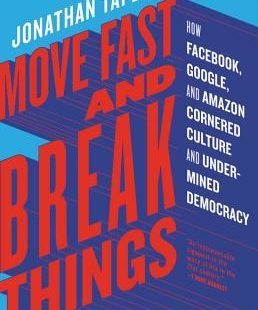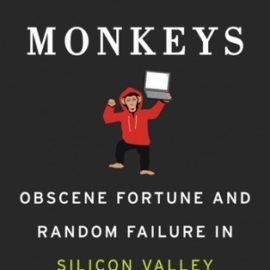Disclosure: I may earn affiliate revenue or commissions if you purchase products from links on my website. The prospect of compensation does not influence what I write about or how my posts are structured. The vast majority of articles on my website do not contain any affiliate links.
Move Fast and Break Things: How Facebook, Google, and Amazon Cornered Culture and Undermined Democracy by Jonathan Taplin
Rating: ★★★
Date Finished: December 24th, 2017
Reading Time: An afternoon
This book wasn’t what I was expecting. I guess that’s what I get for not reading past Break Things.
Move Fast and Break Things is a biased work in which a guy who spent his career in the music industry bemoans the death of that golden goose and blames tech for the plight of the modern artist.
It’s well-written. The pacing is perfect, but the underlying arguments, specifically those centered around the state of content creation, are flawed. Many of the later sections are quite good, but chapter one is particularly bad. I found it difficult to organize my thoughts, so here’s what I have to say.
Chapter 1
The first argument is that social networks are responsible for the proliferation of what was called fake news during the 2016 election cycle. Facebook’s main purpose is to curate content. Then, due to various external pressures, it moderates some content too. But I can’t understand the outrage surrounding fake news (well—I can—it’s because the bad guy won) because we as citizens have a duty to verify the authenticity of the news we view. People act like Facebook was running a ticker tape with fake news headlines. It wasn’t. It was just highlighting what most people were sharing and often this came from sites with no news credentials whatsoever. This was pronounced because everyone’s parents had joined Facebook since the last election cycle, so they didn’t view articles with titles like “Lil Wayne dies of Lean overdose” with the same suspicion as my generation.
The next point in chapter one is that studies have shown that 98% of people can’t begin to understand the implications of the internet. This is scary, but, having run a consumer-facing business on Instagram, I have to believe that this is true. And it generally helps push forward the arguments in this book.
Then we get to Peter Thiel and other megarich people wanting to prolong their lives into the 100s. I say let them. Eventually, that technology will trickle down to me. Nay, says the author, for some reason this means that the average man’s life expectancy will fall to 60.
There is the argument about Amazon decimating the book industry. My family has held many different posts in the book industry, including, most recently, running a packaging and warehousing business, until—yeah—we closed up shop. The employees had lucrative layoff packages because the publisher we contracted for was able to prove in court that eBooks destroyed the print business and that, since eBook readers’ manufacturers were located overseas, the jobs were effectively outsourced. Did I cry over it this cruel twist of fate? Of course I did! We could no longer afford to pay my college tuition! But at the end, in all honesty, there was no point in scapegoating Amazon. The paradigm shifted, it took 15 years for us to feel the pain, and we were left behind fair and square.
The author talks about a lot of things such as income inequality, but, as is common amongst liberals, he frames otherwise innocuous words and phrases in a way that makes them seem dirty. I can tolerate this if it’s accompanied by some explanation, but it never is, and these sections are worthless.
It seems that musicians really have it rough these days. But is it such a terrible thing that mediocre musicians need day jobs? I can’t sympathize.
TimBL
There’s a lot of talk about Tim Berners-Lee’s vision for the internet. There is a notion that he didn’t use his invention to enrich himself because he wanted to forever be known as the white knight (he literally has been knighted) who didn’t create a monopoly. The author mentions how TimBL is still dependent on government funding for his research and how that must be such a bad life. But he seems to forget that there are only a couple of companies that have monopolistic control over their segments of the internet. Of those, they all became monopolies sort of by accident. Is it not a possibility that Tim Berners-Lee didn’t fully understand what opportunities there were for generating profit on the internet? He’s had almost 30 years to latch on to one project that interests him and ride it to IPO. If the man wanted cash money he could have obtained it in a way that didn’t involve sullying his reputation.
Peter Thiel
Chapter 4 is the worst chapter in the book. The author takes aim at Peter Thiel and his controversial book The Diversity Myth. I just read it and find the author’s criticisms to be laughable. Particularly funny is that the author claims it is hypocritical that Peter Thiel, who is gay, spoke out against the collective behaviors of certain groups gay people in the book. If anything, Peter Thiel being gay and writing what he did in the book demonstrates even greater conviction in his beliefs.
Further, the author criticizes Peter Thiel’s takedown of Gawker. Peter Thiel didn’t like Gawker because the website ousted him as gay. The article was published while Thiel was in Saudi Arabia, the most homophobic place on Earth. Also, Thiel had friends whose reputations were damaged by Gawker coverage. It makes sense to me why he’d cut a couple million loose and try to take down the operation. Also omitted by the author is the Gawker ignored the court order from the first ruling (actually, openly mocked it), and that is what sent the website down the digital drain.
Chapter 5 Missteps
It is suggested that it is a bad thing that Google decided to index the entire world wide web. You know, they didn’t ask for permission. The author forgets that indexing was already recognized as a major need (at least by academics) and that, before search engines, websites would be listed in haphazard phonebook-like directories. I cringe at the thought.
Then the author pretends that early YouTube is the YouTube of today in that “all music,” even copyrighted music, is available there (with the insinuation that most of it isn’t hosted in a way that benefits the artist) and is easy to upload. Later in the book, he contradicts this directly by admitting that YouTube has an extremely strict ID system that can catch and prevent virtually any copyrighted track from being posted. Anyone who creates content on the site knows this because they have been affected by it. Very early YouTube (2007) was the wild west, but I don’t agree that any website should have to devout significant resources to moderating copyrighted content unless that website’s express purpose is distributing copyrighted content (Megaupload).
The Band vs The Bandits
I have to give it to Joseph Taplin, who wrote this book and was also the ex-manager of a group known as The Band. Back in 2012, he debated Reddit founder Alexis Ohanian over many of the points recounted in the book. The debate was centered around the fact that The Band’s Levon Helm had cancer and no longer could pay his bills due to the need to tour to make a living. Alexis, after proudly proclaiming that he downloaded copyrighted works for free, tried to get in the last word by sending an open letter. Between that letter being sent and Taplin responding, Levon Helm passed away. Taplin’s eventual response was soul-crushing. It was recounted in this book and it was powerful. If you don’t read the book, you need to look up the exchange, because, though it’s ancient history now, it encapsulates what this debate is all about.
I believe that the internet has empowered the modern content creator. Back in the golden days where the A&R “took care of you” and all that—that’s because any major label’s roster could only support so many artists. If you sounded like The Beatles in the 1960’s, you were that group that sounded like The Beatles and you could make a couple pence playing at your local pub. Sure, the income distribution has become way more stratified, but at least you have a chance now. In the past, everyone aside from exceptional talents needed a lot of luck and sex appeal to make it. Now, it’s totally possible to make it from SoundCloud to the big time. Especially as a rapper, producer, or instrumentalist. In the past, you’d have a demo tape and would have to pray that you could get it into the right hands. Now, artist discovery is easier than ever. The music industry is based on touring and performing, and that’s not great because older artists who aren’t superstars, like Levon Helm, can’t make the same living. If it’s any consolation, I enjoy the current atmosphere because music consumption is so much more democratic. Most kids don’t grow up listening to the radio anymore. Aside from the Grammy’s, there’s no centralized body telling you what to listen to or telling artists what to say. I think that’s a good thing.
Also, was Netflix excluded because it didn’t fit into the narrative? My take is that new age video streaming services (including YouTube Red) have breathed a new life (and a hell of a lot of new money) into a nearly-dead industry. The author must have hit the skip button there.
Chapter 8
I’m going to say it—I like targeted ads. If there’s a server out there crunching all my data and determining what it is that I want, I’m all for it. I picked up cigar smoking as a hobby because I received a targeted ad for Cigars International. I purchased lip balm the other day because something out there made the educated guess that my lips were dry and knew that I preferred Burt’s Bees.
There’s the idea that it’s wrong for Facebook to treat us as lab rats. Every successful website on the internet treats users like lab rats. In the tech world, it’s called A-B testing and it’s where we display different things to different users. Sometimes at random; sometimes not. Facebook’s attempting to influence users’ moods does sound a bit extreme, but that’s all A-B testing is—seeing if different user segments respond differently to different versions of a site experience.
Kim Dotcom was a Loser
After spending his early life as a petty criminal, Kim Dotcom rose to prominence as the founder of Megaupload, which was one of the top torrent sites between 2005 and 2012. He hid behind the veil of being DMCA compliant, which basically means that the site owner has a duty to comply with all reasonable takedown requests. The only problem with Megaupload was that, by my estimate, 97% of the content on the site was infringing on copyrights.
In an irony that has already been lost to the sands of time, major artists endorsed Megaupload. I remember visiting the site and seeing the hottest artists of the day coaxing me to rip their entire catalogs. What a strange few years those were!
Mr. Dotcom’s political ideology never became mainstream and the service he provided was parasitic. It’s no wonder that, once he got busted and stuck in the legal system, everyone stopped caring. He was not a pariah. He just found an opportunity, abused vague copyright laws, and got booked.
The silver lining to all of this, and what I find most incredible, is that the successor to Megaupload, Mega, is an extremely popular filesharing service apparently used for legitimate purposes. It has over 50 million users and 20 billion files, but it’s no longer associated with Kim, so it’s hardly vindicating.
We Are Building Whole Sectors of the Digital Economy on the Concept of Addiction
Chapter 11 was when I started sending out texts telling people how good this book is. What’s said here almost makes up for the stumbles earlier in the book. Taplin discusses the “coliseum culture in which celebrities are thrown to the lions” with a level of clarity that no other writer has captured since the celebrity-throwing became a daily occurrence. If you pick this book up in a bookstore and only read one chapter, number eleven is what it needs to be.
Conclusion
Taplin makes a good effort but puts the blinders on when it is convenient for him. Sometimes his arguments sound like the college liberal. Other times, his lack of technical background causes prevailing logic to take a back seat. I don’t usually recommend books that I disagree with but I think this one is worth a look.
See this review and others on Goodreads.com




